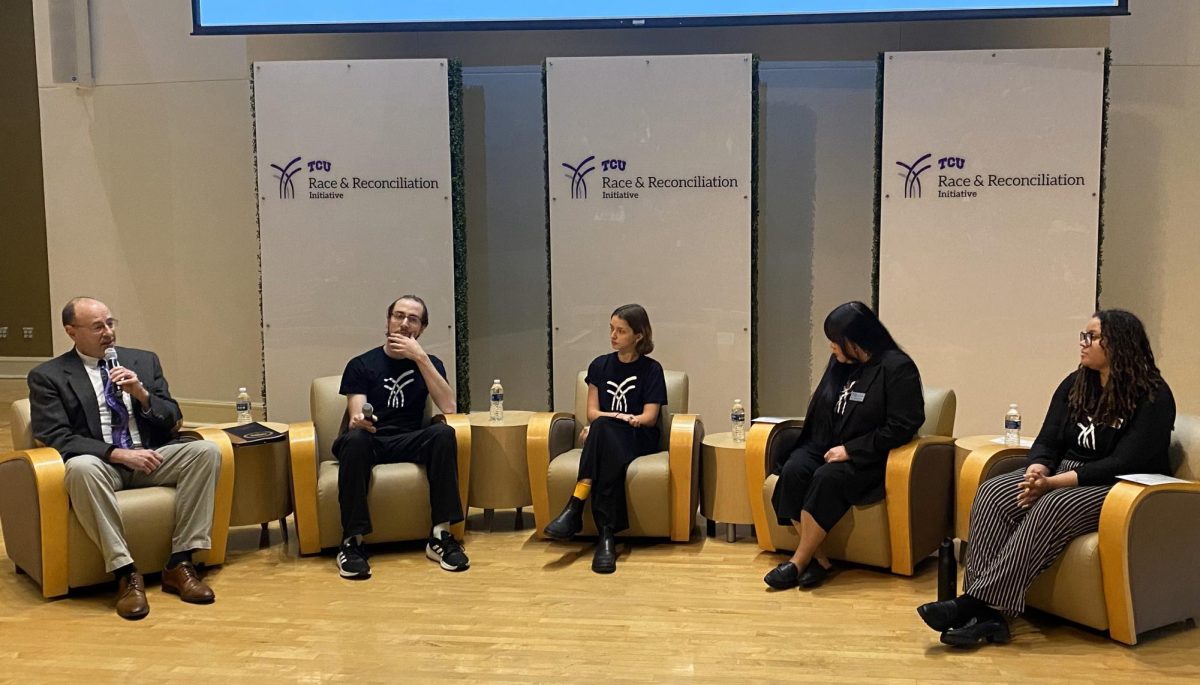Dating becomes an issue about the time boys and girls stop having cooties and start becoming attractive to each other.It can be divided into phases:
Elementary school: Boys chase girls around the playground or pull their hair in class.
Middle school: Dating, or “going out,” consists of sitting next to each other at lunch and meeting at the movies for a group date.
High school: Serious boyfriends or girlfriends who do everything with you from high school proms to family dinners.
TCU: Dating, huh?
In college, we expected new prospects and countless dates, but, in reality, we have entered the dawn of a new and dateless era.
There are countless beautiful girls, fraternity parties and a local bar scene that is always hopping.
“Dating? What dating?” said Jamie Hayes, a junior fashion merchandising major. “Dating doesn’t exist at TCU.”
With such a dating-friendly environment, why is it so hard to date in college?
The answer, as I soon found out, is not that complicated and can be attributed to many factors that are too distinctive to TCU.
Kristin Perkins, a junior psychology major, said the problem at TCU is that the girls are abnormally beautiful, and the guy-to-girl ratio allows the guys to make the dating rules.
According to the Princeton Review, TCU has a 60 percent female population. This shouldn’t be that astounding because, according to a Chicago Times study, there are approximately 2 million more women on university campuses than men.
“Dating doesn’t really exist at TCU because we don’t really have to date,” said senior marketing major Michael Buono. “I meet the most girls at house parties or at the bars.”
With all of the group activities now available, the art and necessity of dating has almost become extinct.
Mixers and other fraternity and sorority functions seem to have replaced the need for dating, said Pamela Stuntz, a psychology professor.
“I’ve noticed dating has shifted from a one-on-one courtship to more a group hangout,” Stuntz said.
Stuntz said another problem is that dating takes time and money – two things many college students don’t have.
“My girlfriends take me out on more dates than guys,” said Paige Passmore, a junior advertising/public relations major. “Most of my friends can count on one hand how many formal dates they have been on at TCU.”
The burden is usually on the male to pay, which not only seems archaic, but also seems to make males at TCU less likely to ask girls out on formal dates, Stuntz said.
Kristin Mueller, a junior English major, said she finds it ironic that guys cannot splurge on a dinner date but are more than willing to buy drinks at a bar in the hopes that the girl will go home with them after a certain amount of alcohol – which probably cost more than a dinner.
The dating that does exist at TCU can be grouped into two categories: the “mini-marriage” or the “late-night hook-up,”
The “mini-marriage” can best be described as a couple joined at the hip, wearing matching sweats and snuggling together on the couch while watching a movie on a Friday night.
The “mini-marriage” category only adds to the TCU stereotype noted by the Princeton Review that “we are very marriage orientated. We joke about obtaining a ‘Mrs.’ degree.”
Sociology professor Angela Thompson, who teaches the sociology of weddings, echoes the statement.
“My class is predominately female, and most of them are very focused on marriage,” Thompson said. “They all have thought and usually planned out their own wedding before they have taken the class.”
While the “mini-marriage” does exist, it seems that the “hook-up” or the “kinda-sorta-hanging-out” method is the dating form of most TCU students.
Whether this is by choice or default is up for much debate.
The “hook-up” usually consists of meeting some guy and all of his friends at a bar or house party, drinking and going home with him afterward.
“It’s kind of backward here,” said Jackie Sova, a junior biology major. “Traditionally, you’re supposed to work up to hooking-up, but here it usually starts with hooking up and then occasionally that will lead to a relationship.”
The consensus of the girls interviewed is that relationships are often ambiguous at TCU.
“Most girls at TCU have to settle for the ‘when it’s convenient relationship,'” Mueller said. “They usually only see the guy at the bar or a party on the weekend, drink with him and then go home with him.”
Students said dating new people is difficult because of the “high school” like nature of TCU.
“Typically, everyone hangs out with just their friends, and they go to the same place with the same people, which makes it hard to find new people to date,” Sova said.
The other problem is that, if you do happen to meet some new fabulous prospect, chances are, his or her dating history isn’t far behind, Hayes said.
Many said relationship problems often come from prior relationships.
“The small, close-knit TCU community makes it hard to escape your dating past and even harder to meet someone who doesn’t have a prior claim on them,” Perkins said.
If this article seems one sided, it might be that, while the women were willing to talk, many of the men interviewed refused to comment on dating at TCU.




